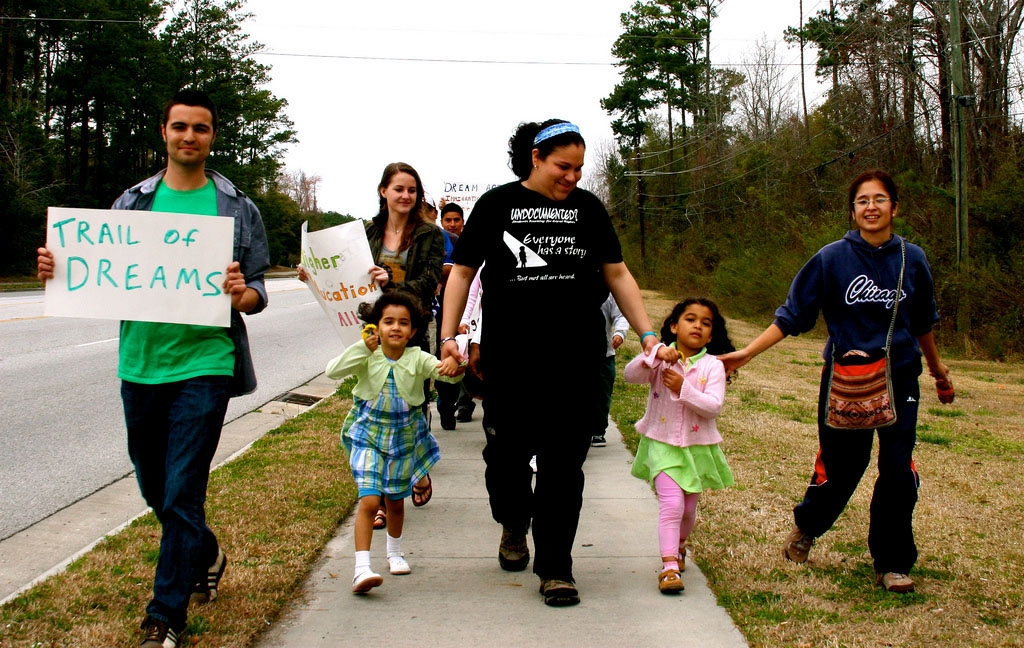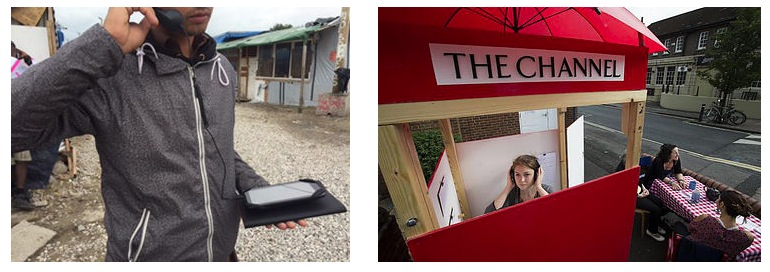What makes people start caring about an issue?
And what makes people go beyond just caring to doing something about it?
These were some of the questions considered during a These Walls Must Fall workshop in Manchester this week, with campaigners from asylum-seeking and other migrant backgrounds. How many people would date their political awakening to being handed a flyer, or asked to sign a petition, or reading a policy report? In all honesty, very few. When artist and creative campaigner Isobel Tarr asks people to close their eyes and to think of a moment when they were awakened to an issue, and what caused that, it’s usually a real, deeply personal experience that sparks it. A human experience.Creative interventions
Isobel presented us with three different examples of a creative intervention to try and change people’s minds about an issue, to engage the imagination. The first was the work of graffiti artist Banksy on the Palestine Wall, or Israeli West Bank Barrier. We discussed how this piece of art activates the imagination and encourages us to imagine a world without the wall (demonstrated to be physically surmountable even in the act of creating the artwork). Next up was the Trail of Dreams, which many people in the room were very enthusiastic about: a group of undocumented migrants who walked through six states in the US and had hundreds of conversations. With personal stories and kindness, they interacted with people who didn’t normally agree with them, about migrants’ rights, about the experience of being undocumented. Image from Beautiful Trouble website
The final example was an action to raise awareness of the 2,900 lives that could be saved every year if the UK stopped burning coal.
Many people affected by this pollution were unable to travel to London to talk to the government about what the power stations were doing to their health. Instead, they created something beautiful and powerful, something gentle that enticed the people working in the government offices into conversations about them. Led by the people most affected by this issue, their voices were at the forefront.
Image from Beautiful Trouble website
The final example was an action to raise awareness of the 2,900 lives that could be saved every year if the UK stopped burning coal.
Many people affected by this pollution were unable to travel to London to talk to the government about what the power stations were doing to their health. Instead, they created something beautiful and powerful, something gentle that enticed the people working in the government offices into conversations about them. Led by the people most affected by this issue, their voices were at the forefront.
 Image: Ron F
A key theme discussed by everyone when looking at these examples was the need to rouse people’s curiosity, to invite someone into a conversation, that they have chosen to be part of, so that their hearts and minds are open.
Image: Ron F
A key theme discussed by everyone when looking at these examples was the need to rouse people’s curiosity, to invite someone into a conversation, that they have chosen to be part of, so that their hearts and minds are open.
Making a song and dance about it
The group thought about examples of arts activism they themselves are involved in – how, with the Wast Nightingales Choir, they are invited into spaces they might not be asked to come and speak. How their play about being an asylum-seeker covers detention, destitution, homelessness and more in just twenty minutes. How songs, drama are an emotional experience, and a relaxed audience may be more receptive to the messages. We then went on to think about the importance of reaching people we don’t normally reach – many of the people in the audience for the choir and drama performances are likely to already be sympathetic. To make change happen, we need to reach new audiences, unusual allies, the broader community.The Channel Project
 Isobel explained the project she did last summer, involving a pop-up pretend telephone box in the streets of Oxford. The project was an exchange of voice messages between people in the Calais ‘Jungle’ refugee and migrant camp and people in Oxford over a period of ten days. Read more about the Channel Project here.
The group really engaged with this project, and agreed that it was important to create a space for people to not just have an emotional experience, to have empathy with others, but then to feel energised and empowered to act.
We talked about whether this project could be done in Manchester, but instead using recordings of people currently in detention. There was resounding agreement that it could, and should.
“I really love this idea” said one participant. “Perfect”, someone said when we asked if this could be used to engage people on the issue of immigration detention.
Where would it happen? Lots of suggestions were forthcoming, but I particularly liked the suggestion of the park, where people’s minds would be fresh, would be open. Which would be busy in the summer, but where people aren’t too busy to take part.
The original Channel Project used a pop-up pretend phone box. “Why not a prison, a small prison for this time?” someone asked.
Isobel explained the project she did last summer, involving a pop-up pretend telephone box in the streets of Oxford. The project was an exchange of voice messages between people in the Calais ‘Jungle’ refugee and migrant camp and people in Oxford over a period of ten days. Read more about the Channel Project here.
The group really engaged with this project, and agreed that it was important to create a space for people to not just have an emotional experience, to have empathy with others, but then to feel energised and empowered to act.
We talked about whether this project could be done in Manchester, but instead using recordings of people currently in detention. There was resounding agreement that it could, and should.
“I really love this idea” said one participant. “Perfect”, someone said when we asked if this could be used to engage people on the issue of immigration detention.
Where would it happen? Lots of suggestions were forthcoming, but I particularly liked the suggestion of the park, where people’s minds would be fresh, would be open. Which would be busy in the summer, but where people aren’t too busy to take part.
The original Channel Project used a pop-up pretend phone box. “Why not a prison, a small prison for this time?” someone asked.

